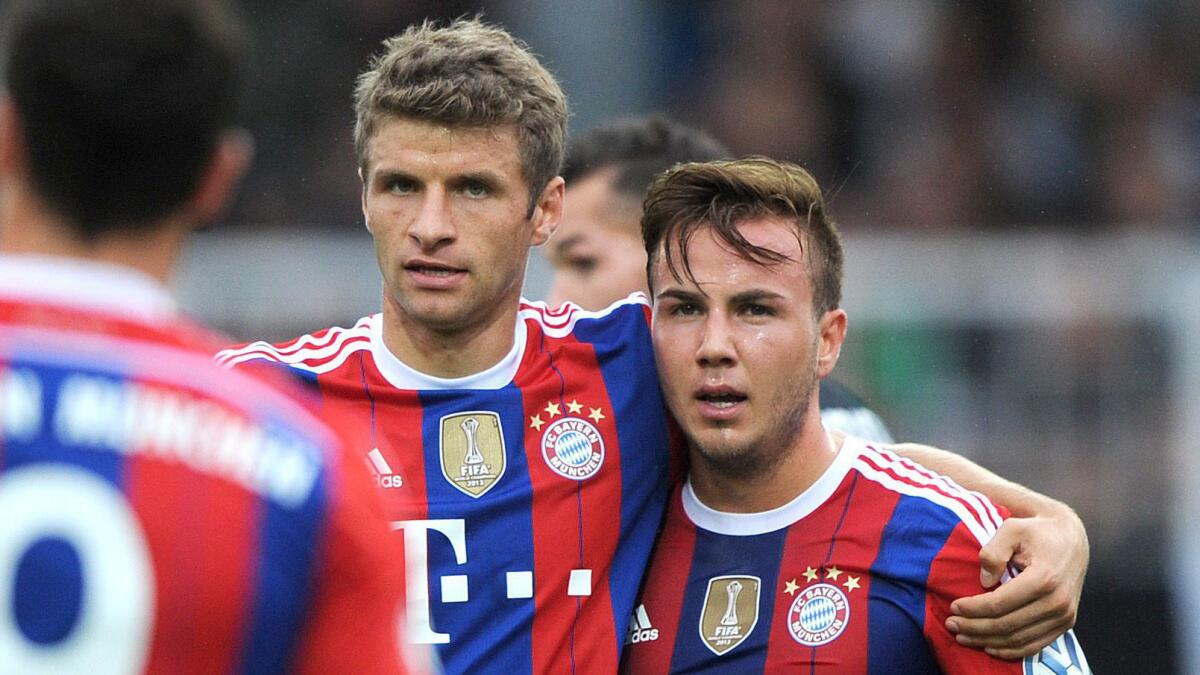The globe’s soccer hotbed? Right now it’s World Cup champion Germany

Christian Seifert has been following soccer’s summer transfer period with equal parts wonder and bemusement.
There was Luis Suarez, jumping from Liverpool to Barcelona for nearly $130 million. James Rodriguez went from Monaco to Real Madrid for $108 million. And Alexis Sanchez left Barcelona for England’s Arsenal for a bargain-basement $58 million.
“We have our own holistic approach. It’s not in the German nature to spend $100 million for one player,” says Seifert who, as chief executive of Germany’s top soccer league, the Bundesliga, should know.
“Germans,” he says, “love to have more money than they spend.”
Economic philosophies aside, this would have been the perfect summer for the Bundesliga to keep its wallet in its pocket anyway, since last month’s World Cup victory did more to call attention to German soccer than any 10 transfers could have.
“We are proud to be the league of the World Cup winners,” Seifert says. “And of course, one or another fan globally gets a little bit closer to German football during the World Cup.
“People know that we are playing good football in Germany.”
That’s been true for a while, since no country has won more European Championships than Germany and on the club level the Bundesliga has sent four teams to the last five Champions League finals.
However, winning a World Cup — the country’s fourth; only Brazil has won more — before a global TV audience of more than 1 billion can’t help but reinforce the idea that the world’s best soccer is being played in Germany. And it’s given Seifert, whose responsibilities include marketing the league internationally, an unrivaled selling point.
“It’s very important to get a larger audience. I am absolutely sure that the Bundesliga will convince more and more fans globally. And of course, winning the World Cup with a lot of players who play in the Bundesliga every weekend is a very good argument when it comes down to talk[ing] with fans globally,” said Seifert, who helped negotiate a massive television deal that will take the Bundesliga into homes in more than 80 countries next season.
In the U.S., the league’s games will be broadcast on Fox. The current Bundesliga season, which kicked off Friday, can be seen on GolTV, a Florida-based cable channel.
The new TV deal is a huge step forward for the Bundesliga, which, despite its success on the field, has long lacked the commercial might of the English Premier League and the star power of Spain’s La Liga, which boasts the last six world players of the year.
Part of the reason for that is the traditionally insular nature of German soccer. For example, 15 of the 23 players off the World Cup title team will play in the Bundesliga this season. And half the players on the 26-man roster of defending league champion Bayern Munich are German — including midfielder Mario Goetze, who scored the goal that beat Argentina in last month’s World Cup, and goalkeeper Manuel Neuer, who made that goal stand up for a 1-0 win.
Compare that with reigning Premier League champion Manchester City, which started just one English player in last Sunday’s EPL opener.
Drawing international players, the theory goes, necessarily opens foreign markets for your teams and, by extension, the league. But Seifert says the Bundesliga’s firm financial foundation has helped persuade many of the top home-grown players to stay home.
A decade ago some of the league’s teams were on the verge of bankruptcy, but Seifert says that in six of the last nine years, the Bundesliga was the most profitable soccer league in Europe. Last year it generated revenues of $2.4 billion, second only to the Premier League. But while Premier League clubs spent an estimated 70% of those revenues on salaries, German teams paid less than $1 billion to their players.
The Bundesliga also drew an average attendance of 43,502 per game last season, the second-highest figure for a domestic sports league in the world behind only the NFL.
“You should not underestimate this new generation of players,” Seifert said. “They are not only looking for the money. They want to have a good team. They want to have a chance to win titles. They want to play in the Champions League.”
And it is a new generation. Just five of the 23 players who dressed for the World Cup final in Brazil were part of the national team when Juergen Klinsmann coached Germany eight years ago. Klinsmann, who now directs the U.S. team, remade German soccer in the run-up to the 2006 World Cup, overhauling everything from the style Germany played on the field to the way it produced its players, putting a heavy emphasis on the country’s fledgling soccer academies. The academies now train the top 5,000 of the 1.8 million youth players registered with the national association
“Juergen Klinsmann definitely had a tremendous impact on the development of German football,” Seifert said, adding that the number of world-class players in Germany has increased tenfold in the last 12 years. “Juergen took the risk and was courageous enough to initiate a change,”
That left Seifert and the Bundesliga to reap the benefits in profits and fans — and, well, there’s that World Cup trophy too. And the league did that its way — which wasn’t exactly cheap, but it was economical.
“The point is that we are not so much focused on these glamorous superstars. We are more focused on the team result and this is what worked out,” Seifert said. “This is what was the way of German success in the past and what will also be the way in the future.”







